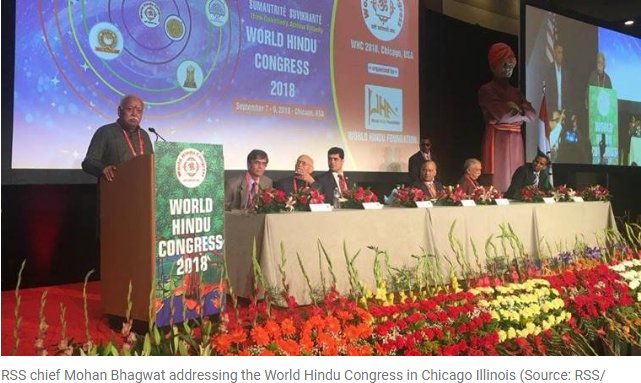Last Updated on September 9, 2018 3:44 pm by INDIAN AWAAZ

Agencies / Chicago
RSS chief Mohan Bhagwat has said that Hindus have suffered for “thousands of years” and they “never come together”. Exhorting Hindus to unite saying even a “lion, if he is alone”, can be destroyed by “wild dogs”.
Speaking at the World Hindu Congress in Chicago Friday, Bhagwat also said that the Hindu community has no aspiration of dominance and will only prosper when it works together as a society.
“Coming together of Hindus itself is a difficult thing. In the initial days of our work, when our karyakartas used to go and talk to Hindu eminences about organising the Hindus. They used to say sher kabhi jhund mein nahi chalta (a lion never travels in a pack). But even that lion, that Royal Bengal Tiger, king of his own jungle, if he is alone, wild dogs together can invade and destroy him,” he said.
Bhagwat said that Hindu society has the most meritorious persons in every aspect of life, “but they never come together, never stay together, they never work together.”
At the World Hindu Congress, organised on the theme drawn from the Mahabharat, ‘Think Collectively, Act Valiantly,’ Bhagwat highlighted the need for Hindus to work together. He said in Hindu dharma, even a pest is not killed, but controlled.
“Hindus don’t live to oppose anybody. We even allow the pests to live. There are people who may oppose us. You have to tackle them without harming them,” Bhagwat said.
Sarsanghchalak Dr Mohanji Bhagwat's address at the World Hindu Congress at Chicago, USA. https://t.co/1Chy6isdfU
— RSS (@RSSorg) September 8, 2018
According to Bhagwat, the Hindu community has no aspiration of dominance and will only prosper when it works together as a society. “We have to learn to work together, separately… For that we take initiative, if we enlist all good meaning people, talk to them about need of the hour, need of the time, duty of Hindu society, and the Hinduness of every one of us,” he said. “Hinduness does not mean any mode of worship or subscribing to any God. Think about the absolute truth.”
Bhagwat said a sense of idealism is good and described himself not as “anti-modern”, but as “pro-future”. “You call me anti-modern, I call myself pro-future. At the same time, we are ancient as well as post-modern. What humanity will have to think twenty years after, we are thinking today. We have to come together and stay together,” he said.
